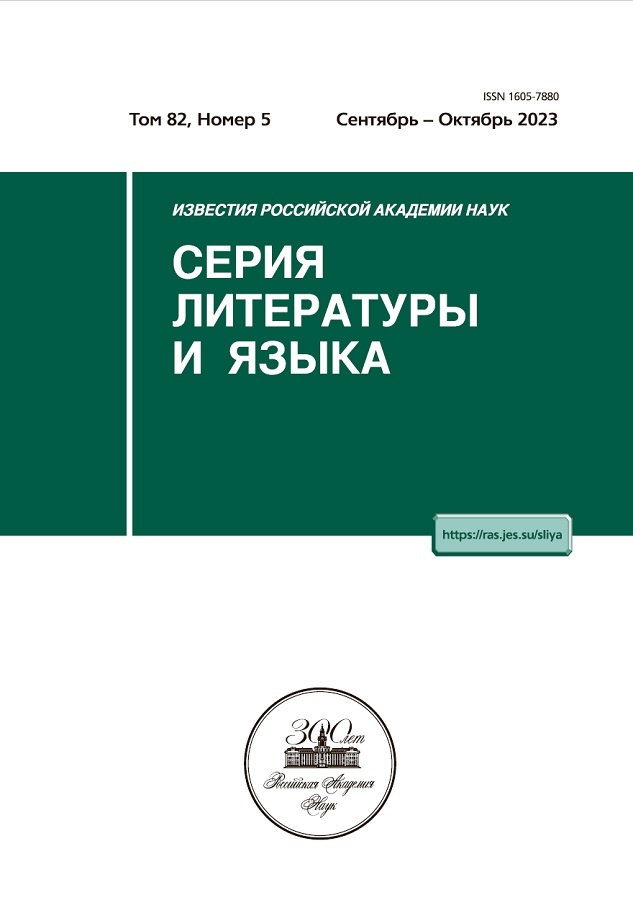“The Fall of Paris” as “the End of Modernism”: Eschatology, War and Ilya Ehrenbourg in a Succession of Cultural Mirrors
- Авторлар: Polonskiy V.V.1
-
Мекемелер:
- A.M. Gorky Institute of World Literature of the RAS
- Шығарылым: Том 82, № 5 (2023)
- Беттер: 5-14
- Бөлім: Articles
- URL: https://rjonco.com/1605-7880/article/view/656933
- DOI: https://doi.org/10.31857/S160578800028322-0
- ID: 656933
Дәйексөз келтіру
Аннотация
The article analyzes Ilya Ehrenbourg’s novel “The Fall of Paris&8j1; (1942) against the background of synchronic and diachronic cultural contexts. The author pays special attention to the mythologization of Paris from the middle of the 19th century and to the ideological consequences of the country’s defeat in the Franco-Prussian War of 1870. The work reconstructs the system of Ehrenbourg’s “eschatological journalism&8j1; during the First World War and shows the connection of the writer’s novel with the cultural background of France “between two wars&8j1;. The novelist’s polemical dialogue with Jean Giraudoux on the Franco-German value-cultural collisions is demonstrated. It is concluded that for Ehrenbourg, as for a number of his Western brethren and recent researchers, the fall of Paris in 1940 was a sign of the end of the entire traditional West of Modern Times, and more specifically, the era of Modernism.
Негізгі сөздер
Авторлар туралы
Vadim Polonskiy
A.M. Gorky Institute of World Literature of the RASRussian Federation, Moscow
Әдебиет тізімі
- Олар А. Культ Разума и культ Верховного существа во время Французской революции / Пер. с фр. Е.С. Коц и А.Н. Карасика. М.: Сеятель, 1925. 235 с.
- Гоголь Н.В. Рим // Гоголь Н.В. Полн. собр. сочинений: В 14 т. Т. 3. М.; Л.: Изд-во АН СССР, 1938. С. 215–259.
- Meyer E. da Costa. Dividing Paris: urban renewal and social inequality, 1852–1870. Princeton; Oxford: Princeton University Press, 2022. 416 p.
- Jordan D. P. Transforming Paris: the life and labors of Baron Haussmann. New York; London; Toronto [etc.]: Free press, 1995. XXII, 455 p.
- Cariani G. Une France russophile? Découverte, réception, impact. La diffusion de la culture russe en France de 1881 à 1914. Thèse de Doctorat en Histoire. Strasbourg: Institut d'Histoire contemporaine UFR des Sciences Historiques, Université des Sciences Humaines de Strasbourg, 1998.
- Gaillard M. Paris: les expositions universelles de 1855 à 1937. Paris: Les Presses Franciliennes, 2003. 184 p.
- Эренбург И. Собр. сочинений: В 8 т. М.: Худож. лит., 1990–2000.
- Берар Е. Бурная жизнь Ильи Эренбурга. М.: НЛО, 2009. 272 с.
- Marcou L. Ilya Ehrenbourg: un homme dans son siècle. Paris: Plon, 1992. 378 p.
- Полонский В.В. Основные векторы поэтико-идеологических трансформаций в русской литературе и публицистике эпохи Первой мировой войны // Вестник Нижегородского университета им. Н.И. Лобачевского. 2014. № 2 (2). С. 13–19.
- Полонский В.В. “Уют на лобном месте”: Первая мировая война в поэтико-идеологических отражениях литературы русского модернизма // Политика и поэтика: русская литература в историко-культурном контексте Первой мировой войны. Публикации, исследования и материалы. М.: ИМЛИ РАН, 2014. С. 703–712.
- Эренбург И. Лик войны. Изд. 2-е. Берлин: Геликон, 1923. 186 с.
- Hinterhäuser H. Fin de siècle: Gestalten und Mythen. München: W. Fink, 1977. 233 S.
- Rodin A. Les Cathedrales de France. Paris: Librairie Armand Colin, 1914. CIX, 164 p.
- Жироду Ж. Пьесы. М.: Искусство, 1981. 648 с.
- Эренбург И. Стихотворения и поэмы. СПб.: Академический проект, 2000. 816 с. (Новая б-ка поэта).
- Цвейг С. Вчерашний мир. М.: Радуга, 1991. 544 с.
- Utopias: Russian Modernist Texts, 1905–1940 / Ed. by Catriona Kelly. London: Penguin, 1999. XXX, 378 p.
- Livak L. In Search of Russian Modernism. Baltimore: Johns Hopkins University Press, 2018. IX, 375 p.
- Ахматова А. Собр. сочинений: В 6 т. М.: Эллис Лак, 1998–2002.
- Иванов Вяч. Стихотворения. Поэмы. Трагедия: В 2 кн. СПб.: Академический проект, 1995. (Новая б-ка поэта).
Қосымша файлдар









